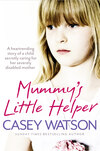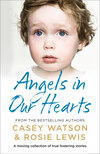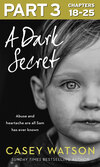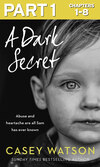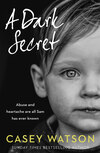Kitabı oku: «Mummy’s Little Helper», sayfa 4
Chapter 6
Despite my resolution not to get involved in things that weren’t my business, Abby was my business and, if it concerned her, it concerned me. So I woke early on Friday morning in a determined mood and with a mental list of questions that needed answers. All of which meant that I couldn’t get back to sleep, so by the time the alarm was due to go off I was already down in the kitchen, pen in one hand, a mug of strong coffee clutched in the other. Since I’d given up smoking, it was my only remaining vice, and one I wouldn’t be giving up any time soon. I sipped the bitter nectar gratefully as I transferred the questions that had been teeming in my brain to a piece of paper. As soon as the taxi came and picked Abby up for school, I knew I had a couple of calls to make.
‘Is it Christmas again?’ asked Mike, trudging blearily into the kitchen and blinking in the brightness of the strip light. ‘Seeing you up at this hour is giving me the strangest feeling of déjà vu.’
It was still pitch-dark, not even seven, and I’d already been up half an hour. I grinned at him. ‘Love, if this were Christmas the turkey would already be in the oven, I’d have Slade blaring out, the Quality Street open, and by now I’d have pulled at least one cracker.’
I pushed my chair back and went across to make him a coffee too – a posh one, from the swish machine we’d treated ourselves to for Christmas. And speaking of Christmas, it was a fair observation. I was nuts about it, and would throw myself into it wholeheartedly, but for the rest of the year Mike was the early riser in the household, bringing the coffee up to me, not vice versa. ‘Well, that’s a relief,’ he said, stretching and yawning. ‘For a minute there I thought you’d be having me up in the loft looking for fairy lights.’
I passed him his coffee. ‘Just couldn’t sleep, that’s all,’ I told him. ‘You know what it’s like when you wake up and straight away your brain reminds you about all the things you need to do? So I thought I’d take a leaf out of Abby’s book and make a list.’
Mike frowned as he sipped his drink. ‘You’re not stressed, are you love?’ he asked, nodding towards the ceiling. ‘About Abby? I mean, compared to Spencer … in fact, compared to all the other kids we’ve had …’
‘No, not at all,’ I reassured him, shaking my head. ‘I’m just on a mission to find out what’s going on there. You know, the more I know about this the harder it is for me to understand how the two of them could have become so isolated. You’d have thought someone would have known what was happening at home, wouldn’t you? What about the GP? I mean, he or she must be prescribing drugs for her, mustn’t they? Or the neighbours? Or, come to that, Abby’s school. Surely they’d have noticed something? It almost beggars belief.’
Mike rolled his eyes. ‘Love, you’re asking me that? You’re asking yourself that? Look at Ashton and Olivia. There’s your answer, right there. Just remember the sort of things that went on in that household. Compared to that, let’s be honest, this is nothing.’
Mike was right, of course. The siblings he’d mentioned – both now thriving in new permanent foster-families, thankfully – had come to us looking like a pair of Dickensian urchins: underweight, covered in scabs, eye-poppingly filthy and feral, yet still living with their parents in the sort of conditions that would have the RSPCA throwing their hands up in horror, let alone the NSPCC. And that was before you took the sexual abuse into account … No, in comparison, this wasn’t a big social scandal. Just a woman who, for whatever reason – blind optimism, maybe? – had seemed to have turned ‘muddling through without troubling the outside world’ into something of an art form.
This was confirmed when I rang Abby’s school, after she’d left for it in the taxi, in the hopes that I’d be able to have a few words with her teacher. Knowing how school timetables tended to work was always a bonus, and I was spot on in being able to grab five minutes with the man, who was a youngish-sounding teacher called Mr Elliot.
‘I’m completely gobsmacked,’ he admitted, when I introduced myself to him. He had no idea that Abby had even been taken into care.
‘I mean, I knew her mum had had to go into hospital,’ he said. ‘But nothing about her going to stay with a foster family or anything. I just assumed she was with other family members. Is this long term?’
I told him I didn’t know. ‘So no one’s been in touch?’ I asked, confused myself now about how this fairly important information had failed to get to him. Not that it didn’t happen from time to time. It had only been a few days, after all, and perhaps Bridget hadn’t yet got around to it.
‘Not to my knowledge,’ he said. ‘Though that doesn’t mean they haven’t. The head teacher was away on a course all day yesterday, so it’s possible that the news just hasn’t trickled through yet … This is a big school, and I wasn’t in myself on Tuesday. These things happen, I suppose … Anyway, thanks for letting me know now.’
‘I’m sure social services will be in touch with you as well,’ I reassured him. ‘Oh, and just so you know, she’ll be coming by taxi each day for the time being, and picked up by taxi as well. I was just phoning myself so we could have a chat about Abby. Under the circumstances, she has a number of issues, as you can imagine …’
‘Circumstances? Forgive me, but as I say, I’m not up to speed.’
‘As a result of her mother’s MS,’ I began.
‘Really? She’s been diagnosed with MS? The poor woman.’
‘Yes, but not recently,’ I explained, once again shocked. He didn’t know this? ‘She’s been suffering with it for years,’ I went on. ‘Abby’s been her carer since she was little, apparently.’
Mr Elliot was even more stunned by this information and maintained he had absolutely no idea. So I spent a few minutes describing the situation, and filling him in on what had been going on at home – as described to me by John and Bridget – after which Mr Elliot seemed flabbergasted.
Not to mention embarrassed. ‘I don’t think anyone here knew anything about this,’ he confirmed. And I believed him. He didn’t sound like he was just covering his back. ‘And you know, Mrs Watson, it explains a great deal. The lateness, the tiredness, the days she’s come in missing kit or uniform …’
So they had noticed something. ‘So why didn’t the school get in touch with her mum?’ I asked him.
‘Oh, believe me, we have. I can think of at least half a dozen letters that have gone home – by post, this is. Not to mention countless phone calls as well. But you know, there’s always been a response from Abby’s mum. And with a plausible excuse as to why, as well. We just – well, I hesitate to say it to you now – but we just thought she was a slightly introverted, slightly difficult child. Only child, of course, and sometimes they can have their own challenges, can’t they? You know – with sharing and so on – connecting with their peers. Oh dear …’ he tailed off. ‘Oh dear, oh dear.’
I wasn’t about to engage in a debate about only children. I’d dealt with children from all sizes of family in my past career, and if I knew one thing it was that you couldn’t make blanket judgements about why children were the way they were. Some only children thrived, some kids from big families didn’t. But, to be fair to Mr Elliot, he was somewhat on the spot, and probably feeling awful about not picking up on all this before.
‘I know,’ I said, ‘but I can see how it happened. And you’ll have only had her in your class for a term and a bit, anyway, wouldn’t you?’ He agreed he had. ‘And from what I’ve seen so far, I think her mum’s been very keen to be self-supporting. It’s just that perhaps she was being unrealistic about just how sick she was. The collapse has at least brought things out into the open. Perhaps now she’ll get some proper help and support. Anyway,’ I finished, ‘I’m glad I’ve been able to put you in the picture. Let’s hope that between us we can help Abby through all this. School’s an important routine right now for her, of course, and she does have a need to keep to routines. Just one last thing –’
‘Of course,’ Mr Elliot answered.
‘Friends. Abby’s adamant she doesn’t actually have any. Is she really that isolated from her peers? Only she has her birthday coming up and I wanted to arrange something for her, but without some friends to invite I don’t know if it’s even feasible.’
I heard a sigh. ‘I’m afraid she’s telling you the truth,’ Mr Elliot said sadly. ‘I mean she mixes okay in class – well, up to a point – as best as can be expected. But, well, between you and me, she has something of a temper. Very easily irritated. She does tend to turn other kids off. I’ve not had a parents’ evening with her mother yet, to be honest. But it would definitely be something I’d be mentioning to her. It’s not that she’s bullied or anything. Just that, well, as I say, she doesn’t seem to want friends. She really is a loner, I’m afraid.’
And now I knew that Sarah always had answers to the school’s concerns, I could see how easy it had been for Abby to remain under the radar.
Schools were busy places, and this one was a large one. And there were likely to be all too many kids constantly above the radar and causing a whole lot more grief.
Kids like the ones I generally fostered myself.
I called John afterwards, both to update him on things generally and to fill him in on school and pass on the message that Abby’s teacher had been completely in the dark. And then I put the whole thing out of my mind and decided to get on with my day. After all, my role in all this was simply to take care of Abby for as long as was needed – not concern myself with whatever was going on with her mother. Of course I couldn’t know then just how dramatic the consequences of ‘concerning myself with Sarah’ would be.
But for now, it was just a small itch of curiosity, easily put out of sight and out of mind. I did my housework with my mind on my own family, mostly, happy that Riley would be over with the little ones the following day. I adored my grandsons as much as any self-respecting nanna, and time spent with them was always very precious.
It would also, I thought, be nice for Abby to meet them, and something of a distraction for a little girl who had way too much of the weight of the world on her shoulders and not a soul – from what Mr Elliot had said – to support her. That she was feeling it was growing ever more obvious as well. When Abby arrived home from school I’d intended to sit her down and see if we could make a little progress with that, at least in relation to school. Once John had fed my news through to Bridget, and she’d been in touch with them herself, perhaps they could start taking measures to keep a closer eye on her and help her through this difficult period.
I made some pancakes, which I could microwave for when she got in, and pondered this odd little girl. Because she’d come to us so suddenly we still hadn’t really had a chance to get to know all her likes and dislikes. As this obviously hadn’t happened, filling it in with Abby now might be the perfect way to get her to open up a little about herself and give me an opportunity to probe a little deeper into school and friendships.
But I was unprepared for how strung out she clearly was. She’d come in from school pale and drawn-looking, and with half her packed lunch uneaten. And though she accepted a hot chocolate, she refused anything else, adamant that she wasn’t hungry. I didn’t press it. I had a feeling it would just stress her more, and at a time when she had more than enough to contend with. And not just with her mother – though she was co-operative enough about answering my questions (even a little animated describing the things she most enjoyed on TV, however unusually adult her choices), as soon as I mentioned having spoken to her teacher her eyes immediately filled with tears.
‘It’s all right, sweetie. You’re not in any trouble,’ I reassured her. ‘I just needed to have a chat with Mr Elliot this morning, so he knows who I am and that you’re staying here, that’s all.’
‘But I couldn’t help it!’ she spluttered, as if she wasn’t even taking in what I was saying, the tears now spilling onto her cheeks. ‘I couldn’t!’
I felt mortified. The last thing I wanted was to upset her. But upset her I clearly had. She was looking really distressed. ‘Couldn’t help what?’ I asked her gently, getting up from the kitchen table and returning with some tissues. ‘Sweetheart, you’re not in trouble, I promise,’ I said. ‘What is it? What couldn’t you help?’
‘About the rota for the beans! And I said I was sorry!’
I had no idea what she was talking about, and gently said so. Upon which she explained, juddering, through both tissue and tears now, that she’d been supposed to be the one watering some bean seeds her group had been growing for an experiment, and how she’d come into school late and forgotten and she’d already been told off, but how someone’s bean had died now and they were all saying it was her fault and someone had been really nasty and called her names and how everybody hated her. And so on. This had been on Monday – so before everything had happened with her mum – but the girl, who was apparently called Hayley (I made a mental note: not one for the party list, then), had got everyone to gang up on her and how it was just horrible.
‘But I couldn’t help it!’ she said again, distress morphing into indignation. ‘I have to go to the post office on Monday!’ she sobbed. ‘To get mummy’s money. And they don’t open till nearly school time and if there’s a queue I have to wait!’
‘You do this every week?’ I asked her.
She looked surprised at the question. ‘Of course,’ she said. ‘Monday is money day. If I didn’t, we wouldn’t have anything to eat, would we?’
Which was a valid enough point. And there was no point in my asking if the teachers knew about this, because I already knew the answer to that one.
‘And I just get so tired,’ she said, her shoulders slumping. She began turning the half-empty chocolate mug around in her hands. Round and round it went, in slow, precise circles. ‘That’s why I forget things,’ she explained. ‘I didn’t mean to forget. I just get so tired when I’m in school.’
‘I’m not surprised,’ I said. ‘What with all the things you do for Mummy. I’d be tired too. And forgetful. But that’s one of the reasons I needed to speak to Mr Elliot,’ I added slowly, keeping an eye on her expression, in case something I said unleashed another flood. ‘Because if they know, they can help you better, and make sure the other children –’
‘How can they help me?’ she wanted to know. ‘I shouldn’t be made to go to school, even. Least, not that much. I have too many more important things to do at home. And what if Mummy falls over? She falls over and she can’t get back up again. What if that happens when I’m at school? An’ she can’t get to the toilet, or anything?’
There was something about the way she said this that made me prick up my ears. ‘Has that happened, Abby?’
I could see her chin dimpling and her eyes filling up again. She didn’t answer. Which I took to mean yes. On both counts. What an image. How on earth did she deal with something like that? She was so slight, for one thing, so, physically, it would be a struggle. And what about psychologically? And there being no one to tell. No one to share it with. How could any mother consider that an acceptable state of affairs? I got out of my seat and squatted down beside Abby’s. Unlike many of the kids I dealt with, she didn’t seem to have any attachment issues, at least; as before, she seemed happy enough to let me pull her into my arms. I could feel her sobs against my chest. ‘I just want Mummy back,’ she mumbled brokenly into my sweatshirt. ‘I just want my mummy back. I want to go home. Please. When can I go HOME?’
‘I know, my love.’ I said, rubbing her back and hugging her. ‘I know.’
I just didn’t know when I could give her an answer.
Chapter 7
‘Listen, winter,’ declared Riley, peering miserably out of the kitchen window. ‘We’ve had enough of you now. Go AWAY!’
It was Saturday lunchtime and the rain was coming down in stair rods, bouncing off the garden furniture that sat huddled on the patio, and turning the whole of our pretty new back garden into a bog. Right now there was such a big pond on the sagging trampoline that I wouldn’t have been surprised to find ducks sitting on it. Not to mention frogspawn and a pair of koi carp.
I didn’t mind the rain myself – it was what made Britain so green and pleasant, after all – but if there were two things that were often incompatible as bedfellows it was rain and stressed mothers with under-fives to keep entertained.
‘It’ll stop,’ I reassured my scowling daughter, as I joined her at the window. ‘You wait. Look. That’s a patch of blue up there, isn’t it?’
Riley snorted. ‘Mother, what are you like? Blue? Come on – that’s just a very slightly different shade of grey. Even your positive mental attitude doesn’t have the power to change that.’ She turned around. ‘So, what shall we do then? Play shops? Make some fairy cakes? Take to the bottle …?’
‘Er, go down to the woods?’
‘What, as in swim there?’
We might have moved house, amassed two grandsons and taken on a new foster child, but some things in the Watson family never changed. Riley and I tended to spend our Saturdays together, while Mike and Kieron did their weekly bit of father–son bonding. Of all the routines Kieron loved (and he loved his routines) having his dad watch him play Saturday league football was his favourite. If Mike wasn’t on the touchline it would thoroughly spoil his day. So, come rain, shine or hurricane, Mike would always be there.
Though one thing, it occurred to me, had changed. Now Kieron was living with his girlfriend Lauren, in a self-contained flat above her parents, I was at least spared the Herculean task – and it would be Herculean, on a day like this – of trying to get the mud out of my son’s kit. And we’d half-planned, Riley and I, to take the little ones on an adventure. It had been such a whirlwind moving into the house, and what with Christmas and New Year, there’d been little opportunity explore the place yet. And it was an area I hardly knew, so I’d been itching to get out and about to investigate our surroundings properly. I’d also spotted that there was a footpath off the green in front of the house, which the lady in the shop had said led down to a little patch of woodland. Perfect for little ones, she’d said (I’d been in there at the time with Levi), as it even had a little stream, where we could go pond dipping.
I’d also fancied getting out because I thought it would be good for Abby. The weekend had started badly, with the early morning news from John Fulshaw that Sarah had contracted some sort of viral infection. We had planned to go and visit her again early evening, but this was now out of the question, both because she was too poorly, and because of the risk of spreading the infection. John could only pass on the news that they’d update us on Sunday.
With her mum already so unwell, I knew Abby would be really traumatised about the news and I’d dreaded having to tell her. Once she’d got over her upset after school the previous evening, she’d talked of little else other than seeing her mum again, and making sure the hospital were looking after her properly.
She’d reacted as I’d expected, her eyes filling once again with tears, and I felt dreadful that I couldn’t even promise her she’d see Sarah on the Sunday either, because, no matter how much I reassured her and plied her with that positive mental attitude of mine, I knew all too well the sort of thoughts that must have been going through her mind.
But I’d been right in thinking that my grandsons would prove a useful distraction. As soon as they arrived, it was as if the storm cloud over her own head had been spirited away. Within minutes of meeting them, she was completely besotted. Which, endearing as they were, I actually found fascinating initially. You could usually get a sense of how older children would be with little ones, and it was more often than not the case that the kids in big families were more at ease around babies. It stood to reason; children with lots of siblings, and perhaps nieces and nephews, just felt more relaxed around babies and toddlers because they were used to having them around. Only children, on the other hand, sometimes had difficulties relating. Without other children in their home lives they were often more used to solitude and their own space, and found the behaviour of little ones challenging. Snatching toys, creating chaos out of order, throwing tantrums – I’d seen it often. All behaviours that could make such children irritable.
It was a generalisation, of course, and a ‘rule’ that was often broken, but, given what we already knew of Abby, my hunch was that though she might enjoy playing with Levi and Jackson for a bit, she would soon find them a little bit tiresome. After all, she found the other kids in school difficult to deal with and, given her home life, she was clearly a solitary child.
Which was one of the reasons I’d been keen to get out on a long walk. Yet it had not been the case – far from it. Straight away she’d set about entertaining the pair of them, dragging out the toy boxes I kept in the hall, under the stairs, and suggesting games she could set up for the little ones to play. It was almost as if she was a mini playgroup leader, and the boys – even Jackson, who was still at that slightly clingy stage – were happy to let her organise them.
‘She’s a sweetie,’ remarked Riley, who had returned from her vigil at the kitchen window and was now preparing some pasta for our lunch. We’d eat at home now, as opposed to going out with some sandwiches, as we’d originally planned, and see how the sky looked after that. If the worst came to the worst then we’d stay in and make those fairy cakes – why not? – but I was still hopeful we’d get out at some point.
I nodded, watching how Abby followed Jackson’s every move, like a particularly over-anxious mother hawk. They were over on the other side of the dining room, building a castle out of Duplo, and all three were engrossed in the task. ‘I feel so sorry for her,’ I told Riley, keeping my voice low. ‘I’m just so aghast how she’s soldiered on so long without anyone having twigged to what was going on at home.’
I told Riley about the conversation I’d had with Abby’s teacher, and about what John and Bridget had found at the house, and how isolated Abby had become. Riley shook her head. ‘Unbelievable,’ she said. ‘What was her mother thinking?’
‘That she’d be less of a burden on Abby, if Abby knew how to look after herself. That’s what she told me, anyway.’
Riley’s face made her feelings clear. ‘Look after herself? Or her mother? Because that sounds more like it to me.’
‘I’m sure there must be an element of that,’ I agreed. ‘But I don’t think that was her intention. I think she really thought she was doing the right thing. I –’
I stopped then, as Abby was fussing around Jackson, who was trying to head off for a quick cruise around the coffee table but was being restrained, much to his annoyance, by her holding onto his dungaree straps. He was growing in confidence every day and he’d be walking soon, I reckoned. If he was allowed to, that was. ‘He’s fine, sweetie,’ I reassured Abby, who was looking anxiously in our direction. ‘Just let go of him. He’ll be okay. And if he falls on his bottom, that’s fine. It’s all part of him learning …’ At which point, of course, Abby having grudgingly relinquished her hold on him, he did fall. And quite sharply, too, having been straining against her.
Abby’s wail of anguish drowned out Jackson’s one of frustration, and she scooped him up as if he’d toppled ten feet, rather than ten inches. ‘Honestly, love,’ Riley tried to reassure her also, ‘he’s fine!’
Abby wasn’t mollified, and still cradled a by now wriggling and indignant Jackson. ‘But he could have fallen against the coffee table and hit his head!’ she persisted. She let him go, however, as he was getting ever more cross in her grasp. She stood up instead, looked around, and seemed to consider. ‘Perhaps I should move the table, do you think?’
We both watched in amusement. She was already reaching for the pile of magazines and the TV remote that were on it.
‘There’s no need …’ I began. Then I thought better of stopping her. ‘But if you’ll feel happier, then by all means. You could slide it around behind the armchair.’ I indicated where. ‘Do you want me to come and help you?’
Silly question. Getting ‘help’ was an alien concept for Abby. The job was done before I could even finish speaking.
Matters didn’t change much over lunch. I was beginning to realise that Abby was incapable of relaxing in the presence of the little ones. By the time we had finished preparing the food there had been major health and safety work accomplished in the living room. Presumably thinking I wouldn’t mind, since I’d been happy enough about her moving the coffee table, Abby had set to work building a little fortress for the three of them. She’d removed all the seat and back cushions from both the sofa and the armchairs and the three of them were now playing Duplo in what looked like some sort of World War One foxhole.
I didn’t mind at all, but once we called them all for lunch itself I began to get an unexpected insight into just how ingrained and acute her anxiety was.
‘Is it okay if I feed Jackson?’ she asked Riley politely, as we sat down.
‘Of course you can, sweetheart,’ Riley answered. ‘If you want to. Be my guest.’ Jackson didn’t really need much help with eating these days, of course. He ate a lot of what we did, and loved feeding himself, too, so by now Riley would only feed him if we were eating on the hoof and she didn’t want the usual attendant mess.
And he was happy enough to let Abby feed him, in any case; like all little ones, he enjoyed the attention. But Abby was much too stressed to enjoy it herself. ‘I think this spaghetti needs mashing up, doesn’t it?’ she asked me anxiously. She was already busy crushing the strands to a virtual pulp. ‘Or he might choke, mightn’t he? You can’t be too careful, you know.’
‘It’s just fine, love,’ I reassured her. ‘He can’t choke on it. It’s too soft.’ Even so, she began giving him the tiniest little mouthfuls, and it was no wonder he kept trying to grab the spoon out of her hand.
Levi, seated the other side of her, was another cause for her hawk-eyed concern. ‘Open wide,’ she kept saying, every time he spooned up a new mouthful. ‘I need to check your mouth’s empty before you put any more food in.’
Levi, clearly bemused, would obediently do so, but after the sixth or seventh time of being inspected in this fashion he turned to me, confused. ‘Nana,’ he wanted to know, ‘is Abby a little mummy?’
Which had us all smiling, Abby included. However, it didn’t escape my notice – though again I didn’t press it – that her own lunch was largely untouched.
We did get our walk in the end, though it ended up being the Sunday before we could head down to explore the woods, when the clouds had finally shifted enough for us to enjoy a little sunshine, even if it was boggy under foot. We’d had a second call from John, too; Sarah was okay, sent her love and would call Abby that evening, but they felt it inadvisable for her to visit that day. They hoped we’d be able to visit again on Monday or Tuesday, which news Abby took on board without too much visible upset.
But the constant tension that I realised seemed always to be around her soon began to manifest itself again. We headed out and the little patch of woodland turned out to be delightful. A tract of land that had been preserved between two large areas of housing, it followed the course of a stream that tumbled down a slight incline, and was criss-crossed with several meandering paths. It was obviously a haven for dog walkers and children, and even in gloomy February, with very little growing yet, it was, I decided, a real find.
But I wasn’t sure Abby could even see it, let alone enjoy it. It was as if, in Levi and Jackson, she had found something else to get herself worked up about. It certainly seemed to be the only thing on her mind.
‘So,’ Mike had asked her, as we’d headed down the pathway across the green. ‘Did you enjoy playing with Levi and Jackson yesterday?’
This simple enquiry had unleashed a kind of torrent; it was as if she’d spent the whole of the previous night worrying and now needed her fears about them to be allayed. Did Riley, she wanted to know, know how to look after them properly? Did she understand about filling a bath with cold water before hot water so there was no danger of scalding them accidentally? Did she understand about germs? Did she have a fire blanket and did she keep it somewhere accessible? Did she have stair gates that she kept closed at all times?
Mike chuckled as we began to make our way through the woods. ‘Oh, don’t you worry. Of course she does,’ he reassured her, glancing across at me, his expression one of mild amusement. ‘Fixed to the wall, they are,’ he added. ‘They even borrowed my drill to do it. And, actually, now I think about it, I’m still waiting for it back.’
‘How d’you know about stair gates and all that stuff, love?’ I asked her. I wondered if she had more experience of little ones than I’d first thought. And if so, from where? Maybe Sarah wasn’t so isolated after all. Maybe there was a friend we didn’t know about.
Ücretsiz ön izlemeyi tamamladınız.
